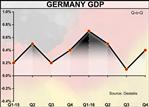
Germany's economic growth accelerated, as initially estimated in the fourth quarter on robust domestic demand.
However, a consumer confidence survey signaled a slowdown in spending this year as rising inflation and changes in the U.S. administration weigh on income and economic expectations.
Gross domestic product grew 0.4 percent sequentially in the fourth quarter, faster than the 0.1 percent expansion seen in the previous three months, and in line with the preliminary estimate, detailed results from Destatis showed Thursday.
The calendar-adjusted GDP growth held steady at 1.7 percent in the fourth quarter. On an unadjusted basis, GDP rose 1.2 percent after climbing 1.5 percent a quarter ago.
The fourth quarter growth figures were confirmed.
A monthly survey from the GfK showed that the forward-looking consumer climate index dropped to 10 in March from 10.2 in February. Economists had forecast a reading of 10.1.
The change of administration in the United States and the considerable recent increase in inflation have put a damper on the generally positive consumer mood in February, the market research group said.
While business surveys suggest that growth will accelerate further in the near term, March's dip in consumer confidence may be an early sign of a slowdown in spending to come, Jennifer McKeown, chief European economist at Capital Economics, said.
GfK forecast private spending to rise 1.5 percent this year. In 2017, private consumption will again significantly contribute to the economic growth, but the group cautioned about a series of risks that could pose a serious hazard to the consumer climate this year.
The economic expectations index of the survey shed 11.9 points to reach a score of 9.7. That was the first fall in five months.
Similarly, the income expectations index dropped by 10.2 points to 48.1 with the decline mainly attributable to rising inflation. The propensity to buy indicator fell six points to 51.6, mainly due to a less favorable economic outlook.
The economic situation in Germany in 2016 was characterized by solid and steady growth, Destatis said.
For the whole year of 2016, GDP advanced by calendar-adjusted 1.8 percent. The provisional annual GDP result released in January has been confirmed.
The breakdown of expenditure side of GDP showed that positive contribution mainly came from domestic demand. Government spending advanced 0.8 percent and household spending by 0.3 percent.
Gross fixed capital formation gained 1.6 percent in construction, while that in machinery and equipment fell slightly 0.1 percent. On the whole, domestic uses rose by 0.9 percent.
The development of foreign trade, however, had a downward effect on growth because the increase in imports of 3.1 percent was markedly larger than the 1.8 percent rise in exports.
Consequently, the balance of exports and imports of goods and services as a whole had a negative effect of 0.4 percentage point on GDP growth.
Another report from Destatis showed that the general government surplus reached its highest level since German reunification in 2016. The surplus increased to EUR 23.7 billion from EUR 20.9 billion in 2015.
by RTT Staff Writer
For comments and feedback: editorial@rttnews.com
Business News

